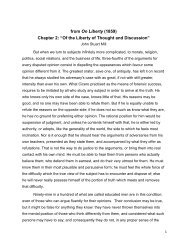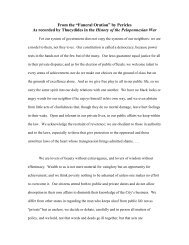Rousseau_contrat-social
You also want an ePaper? Increase the reach of your titles
YUMPU automatically turns print PDFs into web optimized ePapers that Google loves.
interest changes and finds opponents: opinion is no longer unanimous;<br />
the general will ceases to be the will of all; contradictory views and<br />
debates arise; and the best advice is not taken without question.<br />
Finally, when the State, on the eve of ruin, maintains only a vain,<br />
illusory and formal existence, when in every heart the <strong>social</strong> bond is<br />
broken, and the meanest interest brazenly lays hold of the sacred name<br />
of "public good," the general will becomes mute: all men, guided by<br />
secret motives, no more give their views as citizens than if the State<br />
had never been; and iniquitous decrees directed solely to private<br />
interest get passed under the name of laws.<br />
Does it follow from this that the general will is exterminated or<br />
corrupted? Not at all: it is always constant, unalterable and pure; but<br />
it is subordinated to other wills which encroach upon its sphere. Each<br />
man, in detaching his interest from the common interest, sees clearly<br />
that he cannot entirely separate them; but his share in the public<br />
mishaps seems to him negligible beside the exclusive good he aims at<br />
making his own. Apart from this particular good, he wills the general<br />
good in his own interest, as strongly as any one else. Even in selling<br />
his vote for money, he does not extinguish in himself the general will,<br />
but only eludes it. The fault he commits is that of changing the state<br />
of the question, and answering something different from what he is<br />
asked. Instead of saying, by his vote, "It is to the advantage of the<br />
State," he says, "It is of advantage to this or that man or party that<br />
this or that view should prevail." Thus the law of public order in<br />
assemblies is not so much to maintain in them the general will as to<br />
secure that the question be always put to it, and the answer always<br />
given by it.<br />
I could here set down many reflections on the simple right of voting in<br />
every act of Sovereignty -- a right which no one can take from the<br />
citizens -- and also on the right of stating views, making proposals,<br />
dividing and discussing, which the government is always most careful to<br />
leave solely to its members, but this important subject would need a<br />
treatise to itself, and it is impossible to say everything in a single<br />
work.<br />
82











